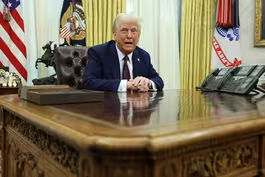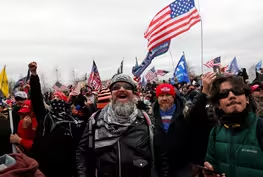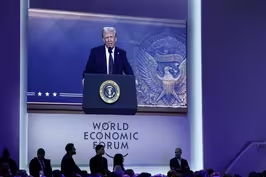
How global business leaders are responding to tariff threats
Clip: 1/23/2025 | 3m 16sVideo has Closed Captions
How global business leaders are responding to Trump's tariff threats
Before an audience of world leaders and top business people, President Trump tried to convince them to invest in the U.S. by promising lower taxes and threatening tariffs if they don't. Geoff Bennett discussed the various messages and threats with David Wessel of the Brookings Institution.
Problems playing video? | Closed Captioning Feedback
Problems playing video? | Closed Captioning Feedback
Major corporate funding for the PBS News Hour is provided by BDO, BNSF, Consumer Cellular, American Cruise Lines, and Raymond James. Funding for the PBS NewsHour Weekend is provided by...

How global business leaders are responding to tariff threats
Clip: 1/23/2025 | 3m 16sVideo has Closed Captions
Before an audience of world leaders and top business people, President Trump tried to convince them to invest in the U.S. by promising lower taxes and threatening tariffs if they don't. Geoff Bennett discussed the various messages and threats with David Wessel of the Brookings Institution.
Problems playing video? | Closed Captioning Feedback
How to Watch PBS News Hour
PBS News Hour is available to stream on pbs.org and the free PBS App, available on iPhone, Apple TV, Android TV, Android smartphones, Amazon Fire TV, Amazon Fire Tablet, Roku, Samsung Smart TV, and Vizio.
Providing Support for PBS.org
Learn Moreabout PBS online sponsorshipGEOFF BENNETT: And let's dive a little deeper into what we heard from President Trump at Davos today.
David Wessel is a senior fellow in economic studies at the Brookings Institution.
Welcome back to the program.
DAVID WESSEL, Brookings Institution: Good to be here.
GEOFF BENNETT: So President Trump speaking to the Davos elite, among other things, he blasted European regulation and trade policies.
Your assessment of his speech and how do you think it landed in the room?
DAVID WESSEL: Well, it seemed like a speech designed to appeal to an American audience, our tough president telling our allies what they need to do.
He was giving instructions left and right.
It was typical Trump, a bit of hyperbole.
He accused Canada of running a $200 billion to $250 billion trade deficit with the United States.
The actual number is $45 billion.
And I wasn't in the room, but I can't imagine -- I don't think they were surprised, but these are the people who prosper from globalization.
And he was basically making the case, America first.
GEOFF BENNETT: The carrot-and-stick approach that he thinks will help solve inflation and also fund his massive tax cut proposals telling business leaders, manufacture your goods in the U.S., or else, or else pay this tariff, how do you think that strategy will play out?
DAVID WESSEL: Well, we will see.
A lot of it depends on the specifics.
How much is he going to impose tariffs?
On whom?
What will the exemptions be?
And, importantly, what will be the retaliation from our trading partners?
The Canadians and Mexicans have already talked about that.
So it may help some domestic manufacturers, but hurt them in their exporting role.
I don't see how it lowers inflation.
It's -- the only question is, how much does it raise inflation?
And I think it's kind of what -- we have to see how much of this is threat and how much is he really going to do?
But, as you know, he has a lot of authority.
The president has a lot of authority on tariffs, not so much on taxes.
For that, he needs Congress.
GEOFF BENNETT: He also seemed to link energy policy and oil production to inflation.
Does he have that right?
DAVID WESSEL: Well, he has the right to link anything he wants.
But energy prices are actually a relatively small part of the consumer basket, about 6 or 7 percent.
And over the last year, energy prices and the price of petroleum products has actually been a negative.
It's been drawing down inflation.
The U.S. is producing more oil than it consumes.
It is producing 20 percent more oil today than it did when President Trump left office.
So it seems a bit overstated.
GEOFF BENNETT: I should have said, is he accurate, not does he have that right?
But... DAVID WESSEL: And also, like, climate change seems to be off the table altogether in his world.
GEOFF BENNETT: Yes, absolutely.
He also said he would demand lower interest rates from the Fed and likewise ask Saudi Arabia to lower its oil prices.
The next Fed meeting is January 29.
It's expected to hold rates steady.
What influence can he have on either of those fronts?
DAVID WESSEL: I don't think he can have much influence.
Obviously, if the U.S. produces more oil, it's a world market for oil, it might lower prices.
The Saudis have played this game for a long time.
If you want prices to go down, you produce more.
Not sure American producers are going to be happy with lower oil prices.
As far as the Fed goes, I think it's all bluster until he gets his chance to replace Jay Powell in May of 2026.
Until then, the Fed will, I think, stand up to him.
GEOFF BENNETT: You think so?
DAVID WESSEL: Yes.
GEOFF BENNETT: All right, David Wessel, thanks so much for being with us.
DAVID WESSEL: You're welcome.
Judge blocks Trump's order ending birthright citizenship
Video has Closed Captions
Clip: 1/23/2025 | 6m 30s | Federal judge puts blocks on Trump's order to end birthright citizenship (6m 30s)
Judges who oversaw cases frustrated by Jan. 6 pardons
Video has Closed Captions
Clip: 1/23/2025 | 6m 52s | After Jan. 6 pardons, judges who oversaw cases express frustrations (6m 52s)
A look at destruction in Lebanon from Israeli airstrikes
Video has Closed Captions
Clip: 1/23/2025 | 6m 42s | A look at destruction in Lebanon from Israeli airstrikes and occupation of border region (6m 42s)
Meet the team behind Watch Duty app giving wildfire updates
Video has Closed Captions
Clip: 1/23/2025 | 5m 35s | Meet the small team behind the Watch Duty app giving life-saving wildfire updates (5m 35s)
News Wrap: California crews battling new fires in LA area
Video has Closed Captions
Clip: 1/23/2025 | 5m 26s | News Wrap: California crews battling new fires in Los Angeles area (5m 26s)
The steps an Ohio county took to reduce infant mortality
Video has Closed Captions
Clip: 1/23/2025 | 8m 17s | The steps an Ohio county took to reduce infant mortality rates (8m 17s)
Trump lays out demands in reintroduction to world stage
Video has Closed Captions
Clip: 1/23/2025 | 4m 50s | Trump lays out demands in virtual reintroduction to world stage (4m 50s)
Trump willing to use economic pressure on Russia to end war
Video has Closed Captions
Clip: 1/23/2025 | 4m 3s | Trump says he's willing to use economic pressure on Russia to end Ukraine war (4m 3s)
Providing Support for PBS.org
Learn Moreabout PBS online sponsorship
- News and Public Affairs

FRONTLINE is investigative journalism that questions, explains and changes our world.

- News and Public Affairs

Amanpour and Company features conversations with leaders and decision makers.












Support for PBS provided by:
Major corporate funding for the PBS News Hour is provided by BDO, BNSF, Consumer Cellular, American Cruise Lines, and Raymond James. Funding for the PBS NewsHour Weekend is provided by...







